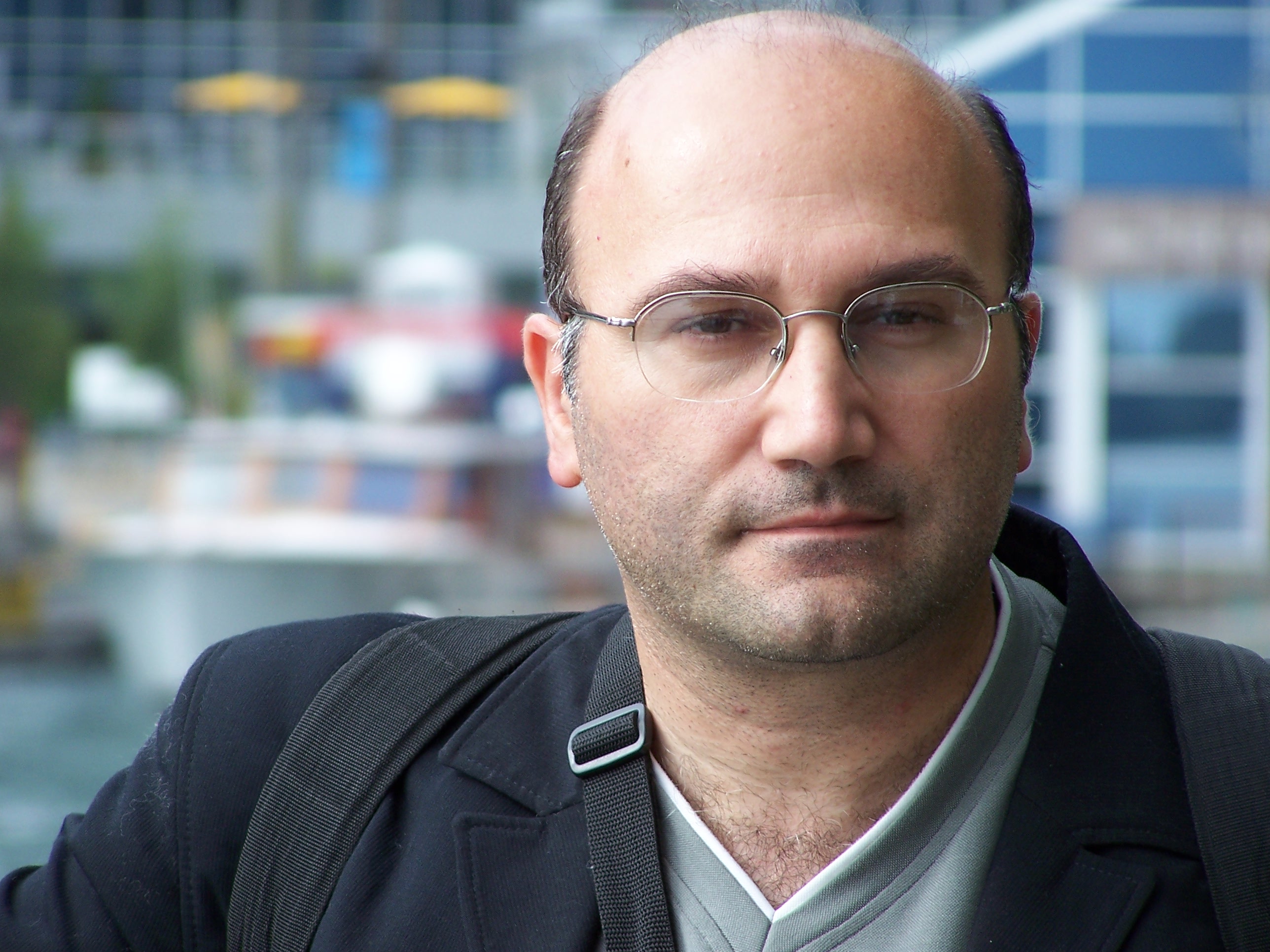Program of the workshop
Agenda of the workshop:
- 1.30 : 1.35 Introduction by the moderators
- 1.35 : 2.05 Personal Intelligent City Accessible Vehicle System (PICAV)
- 2.05 : 2.35 The DALi project: exploring new frontiers for assisted living devices
- 2.35 : 3:05 Interactive Controller for Strolling with smart walker: Final testing with aged people.
- 3.05 : 3.25 Round Table and demo of prototype
Invited Speaker(s):
 Dr. Fawzi Nashashibi,
Dr. Fawzi Nashashibi, Researcher at INRIA Rocquencourt.
Title of the presentation: Personal Intelligent City Accessible Vehicle System (PICAV)
Abstract: PICAV is a new mobility concept for passengers ensuring accessibility for all in urban pedestrian environments. The system is developed in the framework of the European FP7 project (PICAV) and integrates a fleet of PICAV units. Some of its features are specifically designed for people whose mobility is restricted for different reasons. The main drivers of PICAV design are: ergonomics, comfort, stability, small size, mobility dexterity on-board intelligence, assisted driving, eco-sustainability, parking, vehicle/infrastructures intelligent networking. PICAV system usefully integrates the existing public transport system to make it become more accessible for older and disabled people by acting as a smooth link between walking, bicycle and conventional public transport. This presentation will describe this project and highlight its achievements. The PICAV unit will be presented and preliminary results and perspectives presented.
Bio: Dr. Fawzi Nashashibi, 46 years, is a senior researcher and the Program Manager of IMARA Team at INRIA (Paris-Rocquencourt) since 2010. He has been senior researcher and Program Manager in the robotics centre of the Ecole des Mines de Paris (Mines ParisTech) since 1994 and was an R&D engineer and a project manager at ARMINES since May 2000. He was previously a research engineer at PROMIP (working on mobile robotics perception dedicated to space exploration) and a technical manager at Light Co. where he led the developments of Virtal Reality/Augmented Reality applications.
Fawzi Nashashibi has a Master's Degree in Automation, Industrial Engineering and Signal Processing (LAAS/CNRS), a PhD in Robotics from Toulouse University prepared in (LAAS/CNRS) laboratory, and a HDR Diploma (Accreditation to research supervision) from University of Pierre et Marie Curie (Paris 6).
His main research topics are in environment perception and multi-sensor fusion, vehicle positioning and environment 3D modeling with main applications in Intelligent Transport Systems and Robotics.
He played key roles in more than 50 European and national French projects such as Carsense, ARCOS, ABV, LOVe, HAVE-it, SPEEDCAM, PICAV, CityMobil... some of which he is coordinating. He is also involved in many collaborations with French and international academics and industrial partners. He is author of numerous publications and patents in the field of ITS and ADAS systems.
His current interest focuses on advanced urban mobility through the design and development of highly Automated Transportation Systems. This includes Highly Automated Unmanned Guided Vehicles (such as Cybercars) as well automated personal vehicles.
 Dr. Daniele Fontanelli,
Dr. Daniele Fontanelli, Associate Researcher at Universita degli Studi di Trento
Title of the presentation:The DALi project: exploring new frontiers for assisted living devices
Abstract: There is an unmistakable trend in developed countries towards population ageing. The median age in Europe is predicted to increase from 37.7 years old in 2003 to 52.3 years old by 2050. The incoming demographic tide presents important economic and societal challenges ranging from cost-effective health care and social services to pension provision. At stake is the quality of life for our ageing
populations. In this context, the DALi (Devices for Assisted Living) project targets a user group consisting of older adults with emerging non-severe cognitive disabilities. These are often compounded by a deterioration in auditory and visual sensing abilities. Our target population exhibits retarded reaction to external stimuli and diminished navigation skills. One major consequence of these problems is an increasing difficulty in moving in complex unstructured environments such as shops, parks, or public transportation stations. Such cognitive deficiencies gradually reduce the space for autonomous life and deprive the afflicted of
essential social interactions.
Standard assistive devices are of little help for cognitive disabilities. What is needed is a new approach: a cognitive navigation prosthesis (CNP). This is a device that assists navigation in unstructured and crowded environments by acquiring sensory information, by anticipating the intent of human agents and by deciding the path that minimises the risk of impacts or of anti-social behaviours. With recent advances in sensing, automated reasoning, and crowd modelling this ambitious objective becomes technologically feasible.
As a paradigm of a potentially larger class of devices that can integrate the CNP, the target of the DALi project is a new walking assistant. More specifically, we prototype a novel cognitive walking assistant (the c-Walker). We envisage the c-Walker to be a kinematically passive haptic device based on a standard mobile platform. The CNP adds critical intelligence to assist the decision making function of the assisted person. We stress the assistive function of the c-Walker: the assisted person remains in charge of decision-making and the system does not override his/her intent. Instead, it operates supportively, offering appropriate recommendations.
Bio: Daniele Fontanelli received the M.S. degree in Information Engineering in 2001, and the Ph.D. degree in Automation, Robotics and Bioengineering in 2006, both from the University of Pisa, Pisa, Italy. He was a Visiting Scientist with the Vision Lab of the University of California at Los Angeles, Los Angeles, US, from 2006 to 2007. From 2007 to 2008, he has been an Associate Researcher with the Interdepartment Research Center ``E. Piaggio'', University of Pisa. From 2008 he joined as an Associate Researcher the Department of Information Engineering and Computer Science, University of Trento, Trento, Italy. His research interests include mobile robotics and visual servoing, human robot interaction, real-time control, resource aware control and wireless sensor networks.
 Dr. Ludovic Saint-Bauzel,
Dr. Ludovic Saint-Bauzel, Associate Professor at UPMC Sorbonne Universities
Title of the presentation:Interactive Controller for Strolling with smart walker: Final testing
with aged people.
Abstract: The ageing of our western societies leads to an increasing need of
assisting
device that is not to be demonstrated anymore. Robotics device could
provide many new services that can improve life of our elderly. This
workshop talk will present smart-walkers develop at ISIR and will
focus on its controller. The controller based on force interaction
has shown its genericity by the use in 2 devices. I will study the
assets of this control approach.
Bio: After an Engineering Diploma (Master Degree) in Computer Science
specialized in Software Architecture in 2003 in Nancy University
(Henry Poincare) in ESIAL school of engineering , Dr Saint-Bauzel
obtained a Master Degree in Robotics and Intelligent Systems in 2004
at UPMC. Then he continues his studies with a PhD in 2007 at the same
university, he was in the same time a lecturer in Polytechnique School
of Engineering (Palaiseau). The subject of his PhD was to model
diseased people with neural network and apply this predictive observer
to a Assistive Device that provides support in Sit-To-Stand Transition
and in Walking. After this degree he starts his career at "UPMC
Sorbonne Universites" first as a Assistant Professor in 2009 and then
as an Associate Professor.
Demos of prototypes
We propose to bring a prototype that can assist people with reduced mobility.
Last modified the 8th of february 2013
Anne Spalanzani. INRIA Rhône-Alpes, 655 Avenue de l'Europe, 38334 Saint
Ismier Cedex, France
Phone: +33 4 7661 5292 -- Fax: +33 4 7661 5477
Email: Anne.Spalanzani"followed by"@"and by"inria.fr
 Dr. Fawzi Nashashibi, Researcher at INRIA Rocquencourt.
Dr. Fawzi Nashashibi, Researcher at INRIA Rocquencourt. Dr. Fawzi Nashashibi, Researcher at INRIA Rocquencourt.
Dr. Fawzi Nashashibi, Researcher at INRIA Rocquencourt. Dr. Daniele Fontanelli, Associate Researcher at Universita degli Studi di Trento
Dr. Daniele Fontanelli, Associate Researcher at Universita degli Studi di Trento Dr. Ludovic Saint-Bauzel, Associate Professor at UPMC Sorbonne Universities
Dr. Ludovic Saint-Bauzel, Associate Professor at UPMC Sorbonne Universities